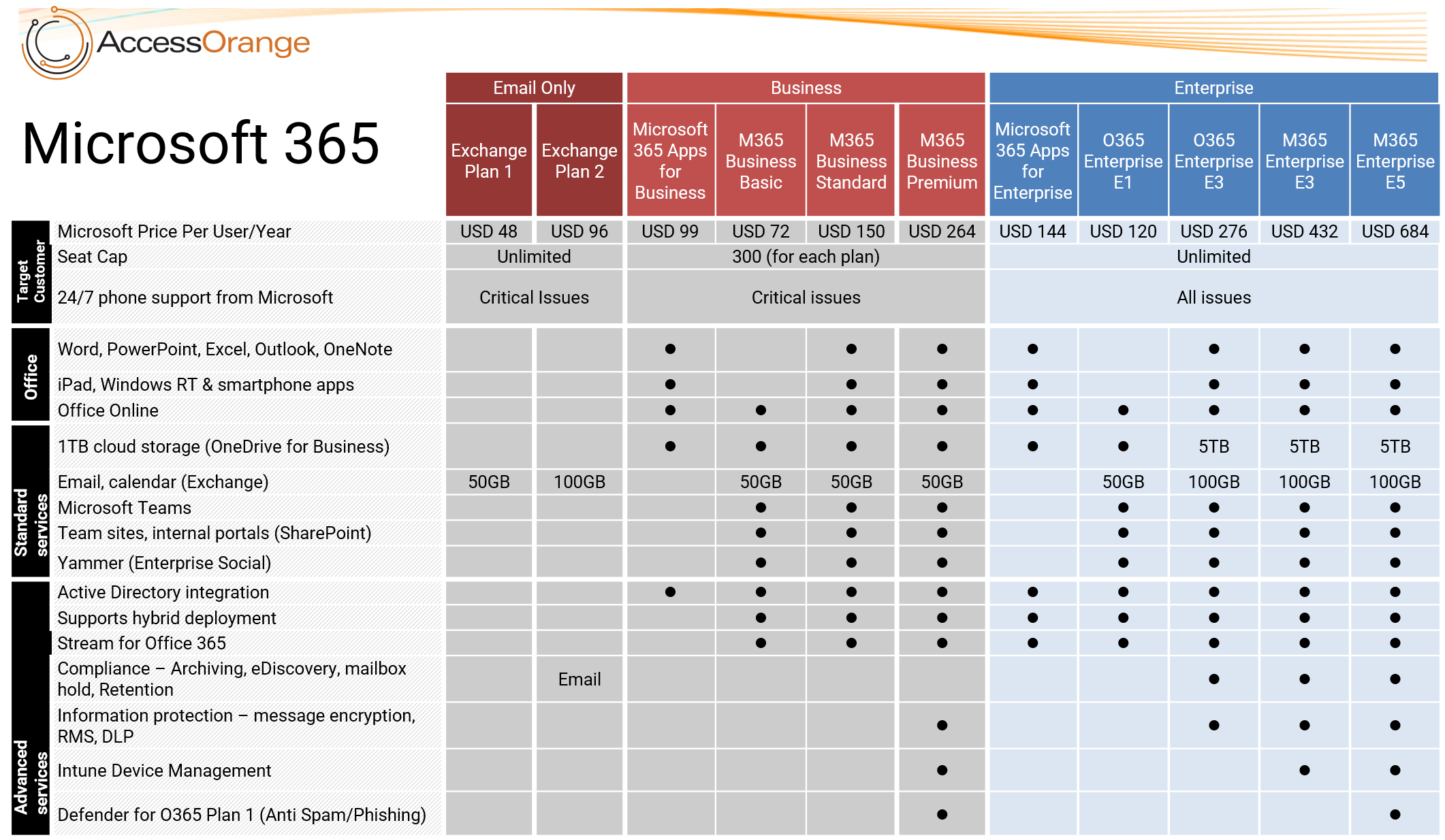Exchange Online Plan 1 and Microsoft 365 Business Basic are two different subscription plans offered by Microsoft. Both plans offer email and calendar capabilities, but there are some key differences between them that may make one plan more suitable for a business than the other.
Exchange Online Plan 1 is a standalone email and calendar service that is part of the Microsoft 365 suite of products. It is designed for businesses that need a robust email and calendar solution, but do not require the additional productivity and collaboration tools that are included in other Microsoft 365 plans. Exchange Online Plan 1 includes features such as 50GB of email storage, support for email and calendar sharing, and integration with Microsoft Outlook and other email clients.
Microsoft 365 Business Basic, on the other hand, is a comprehensive productivity and collaboration suite that includes Exchange Online Plan 1 as well as other tools such as Microsoft Word, Excel, PowerPoint, and OneDrive. It is designed for small and medium-sized businesses that need a full suite of productivity and collaboration tools to help them work more efficiently and effectively. In addition to email and calendar capabilities, Microsoft 365 Business Basic also includes tools for document creation and sharing, online meetings and video conferencing, and team collaboration.
One of the main differences between Exchange Online Plan 1 and Microsoft 365 Business Basic is the scope of features and tools included in each plan. Exchange Online Plan 1 is a standalone email and calendar service, while Microsoft 365 Business Basic is a comprehensive suite of productivity and collaboration tools. This means that if you are a business that only needs email and calendar capabilities, Exchange Online Plan 1 may be a better fit for you. However, if you need a full suite of tools to help your business run more efficiently and effectively, Microsoft 365 Business Basic may be a better choice.
Another difference between the two plans is the pricing structure. Exchange Online Plan 1 is typically offered as a monthly or annual subscription, while Microsoft 365 Business Basic is typically offered as an annual subscription. This means that if you choose Microsoft 365 Business Basic, you will need to pay for the full year upfront, while with Exchange Online Plan 1 you have the option to pay on a monthly or annual basis.
Exchange Online Plan 1 and Microsoft 365 Business Basic are two different subscription plans offered by Microsoft that cater to different needs and budgets. Exchange Online Plan 1 is a standalone email and calendar service that is suitable for businesses that only need these capabilities, while Microsoft 365 Business Basic is a comprehensive suite of productivity and collaboration tools that is suitable for small and medium-sized businesses that need a full range of tools to help them work more efficiently and effectively.
Making the right choice for your business
Your business should consider choosing Exchange Online Plan 1 over Microsoft 365 Business Basic if they only need email and calendar capabilities and do not require the additional productivity and collaboration tools offered by Microsoft 365 Business Basic. Exchange Online Plan 1 is a standalone email and calendar service that is part of the Microsoft 365 suite of products and is designed specifically for businesses that only need these capabilities.
That being said, Microsoft 365 Business Basic is a comprehensive productivity and collaboration suite that includes Exchange Online Plan 1 as well as other tools such as Microsoft Word, Excel, PowerPoint, and OneDrive. It is designed for small and medium-sized businesses that need a full suite of tools to help them work more efficiently and effectively. If a business requires a full range of productivity and collaboration tools in addition to email and calendar capabilities, Microsoft 365 Business Basic may be a better fit.
In general, the choice between Exchange Online Plan 1 and Microsoft 365 Business Basic will depend on the specific needs and budget of the business. If a business only needs email and calendar capabilities, Exchange Online Plan 1 may be a more cost-effective option. However, if a business needs a full suite of productivity and collaboration tools, Microsoft 365 Business Basic may be a better choice. It is important for businesses to carefully evaluate their specific needs and budget when deciding between these two subscription plans.
Please see below table for a more complete overview of the differences between each edition.

(Microsoft prices per 12-2022. Contact us to get the best deal for your organization!)
Want to know more? Contact us at [email protected] and we’ll have one of our consultants discuss with you what is the best option for your organization.

